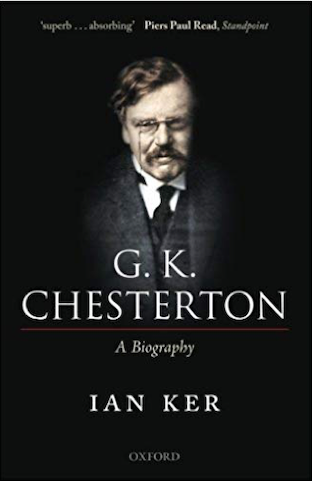
“Chesterton begins The Everlasting Man, one of the two or three greatest of his half-dozen or so major works, by pointing out that in a post-Christian age it is very difficult to see Christianity for what it is: post-Christians ‘still live in the shadow of the faith and have lost the light of the faith’. They are in a state of reaction: ‘They cannot be Christians and they cannot leave off being Anti-Christians.’ They are not ‘far enough away not to hate’ Christianity, nor are they ‘near enough to love it’. And so, ‘while the best judge of Christianity is a Christian, the next best judge would be something more like a Confucian’. But the worst judge of all is the man now most ready with his judgments; the ill-educated Christian turning gradually into the ill-tempered agnostic. . . .
“Chesterton dismisses the ‘fashionable’ idea that ‘a monkey evolved into a man and in the same way a barbarian evolved into a civilised man’. Far from there having been moral progress, ‘as a matter of fact some of the very highest civilisations of the world were the very places where the horns of Satan were exalted, not only to the stars but in the face of the sun’. In politics, again, a primitive society was likely to be like a pure democracy, since ‘simple agricultural communities are by far the purest democracies’. Far from there being necessarily progress, ‘democracy is a thing which is always breaking down through the complexity of civilisation’. Such is the ‘evolutionary mania’ that people have become convinced ‘that every great thing grows from a seed, or something smaller than itself. They seem to forget that every seed comes from a tree, or from something larger than itself’. In the case of religion, it was much more likely that monotheism preceded polytheism, that religion did not originally come from some detail that was forgotten, because it was too small to be traced’: ‘Much more probably it was an idea that was abandoned because it was too large to be managed. There is very good reason to suppose many people did begin with the simple but overwhelming idea of one God who governs all; and fell away into such things as demon-worship almost as a secret dissipation’. In paganism God ‘is something assumed and forgotten and remembered by accident’. He is ‘the higher deity’ who ‘is remembered in the higher moral grades and is a sort of mystery’. What seemed clear to Chesterton was that ‘there was never any such thing as the Evolution of the Idea of God. The idea was concealed, was avoided, was almost forgotten, was even explained away; but it was never evolved’. Polytheism itself seems often to have consisted of ‘the combination of several monotheisms’, while Confucianism seems to be ‘a rather vague theism’ in which ‘a simple truth’ seems to have ‘receded, until it was remote without ceasing to be true’. The fact that there was ‘a strange silence’ about God certainly suggested the absence of God’ — but not necessarily the ‘non-existence’ of God: there was ‘a void’ but not ‘a negation’. There was ‘an empty chair’ or rather ‘an empty throne’. And Chesterton invokes his favourite image of the back: ‘it was as if some immeasurable presence had turned its back on the world’. There was in a very real sense the presence of the absence of God’, which one could feel, for example, ‘in the unfathomable sadness of pagan poetry’. There was the implication that the gods of the pagans were ‘ultimately related to something else, even when that Unknown God has faded into a Fate’. For ‘what was truly divine’ seemed ‘very distant, so distant that they dismissed it more and more from their minds’. But what was quite clear was that they knew there was something wrong with the world: ‘These men were conscious of the Fall, if they were conscious of nothing else. Still, God “really” had been sacrificed to the Gods; in a very literal sense of the flippant phrase, they have been too many for him’.”
— from Ian Ker, G. K. Chesterton: A Biography (Oxford University Press, 2011)
Ian Ker discussed this book on Volume 111, of the Journal.